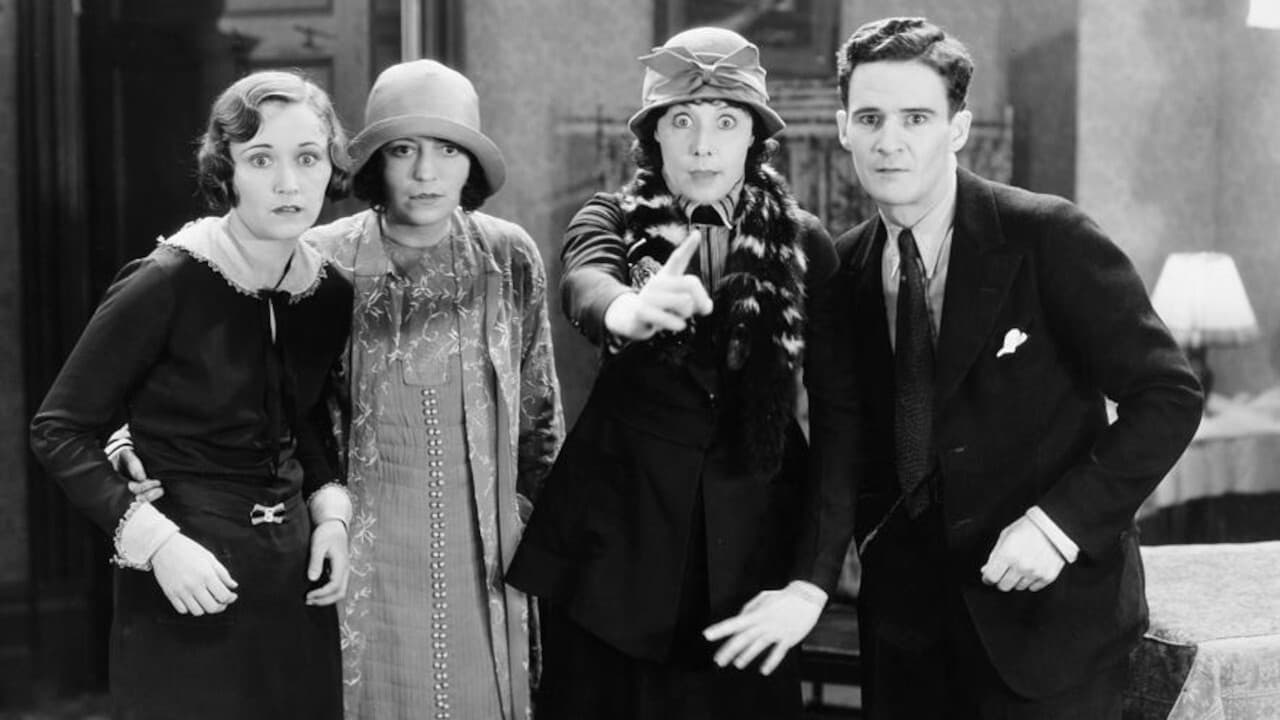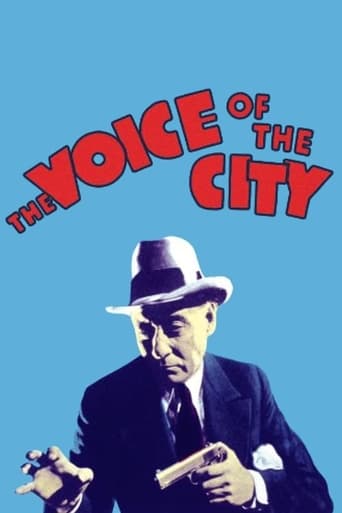

Robert Ames was a promising screen actor whose life and career were cut short due to alcohol. Before then he had been a dependable stage actor who had played opposite Ruth Chatterton in "Come Out of the Kitchen". This movie was made at the peak of his career with the flip and witty "Holiday" still to come.His female co-stars were not exactly dazzling. Sylvia Field made a couple of films around the dawn of sound, disappeared, then came back in the early forties for character parts. Duane Thompson had been a 1925 Wampas Baby star but had found her acting vocation in westerns with stars such as Buzz Barton and Ted Wells - "Voice of the City" proved her last but one film.The actors to watch are Robert Ames, Willard Mack and John Miljan, perfecting his oily persona which stood him in good stead for many years to come. Ames plays Bobby Doyle who, as the film starts, is going over the wall in a prison break. So far, so good, but it soon after descends into a talk fest as Doyle, with "Johnny the Hop"'s help, quickly makes his way to Beebe's flat. I know talkies were new and different, acting had to be learned but Sylvia Field came from the "wide eyed" school of acting and her part was big - she was almost the equal star. She was in many of the conversational scenes and her gooey acting got a bit much at times - especially when both she and Mary are convinced of the loyalty of Don Wilkes (it's Miljan, of course), a mobster who is frantically working behind the scenes to put the police on Doyle's trail - if he can only wheedle the information out of Beebe. She has given her solemn vow not to disclose Bobby's whereabouts but within minutes under Don's smooth lies she is singing like a canary!!!Detective Biff was played by Willard Mack who also directed the movie. He had been an actor and a writer (he wrote "Tiger Rose", Lenore Ulric's greatest stage triumph) and had also been married to two beautiful actresses, Marjorie Rambeau and Pauline Frederick but he was also an alcoholic and an addict and died in the early 1930s. His Biff really channelled the type of policeman that Thomas E. Jackson was soon to make his own - raspy voiced, slow of speech, a Mr. Cool of 1929!! He also flings around a few phrases - "snowbird", "shoot that in your arm, hop, either arm"!! so the viewers know exactly the type of "problem" that Johnny has!! Also Johnny's furtive looks and skulking out of camera range with a spoon but Beebe seems none the wiser!! Johnny was the initiator of the jail break but because of his habit, police soon have him in custody, hoping with his supply cut off he will squeal - and he does!!Again there is not much action and it is clear that MGM were not comfortable with this type of gritty crime story. Robert Ames was good but once he went to the hideout there were often long stretches were Field had to hold the film up and she just wasn't able to. The most thrilling scene, when the police burst into his hide-out only to find him hanging by a rafter - but of course he is only foxing!! MGM wouldn't dare kill off the movie's hero 5 minutes before the end. Clark Marshall who was pretty good playing Johnny, was another actor who fell through the cracks - he made a couple of movies in 1919, 1920, then made a few more from 1929 on, playing parts like Lefty and Runchy!!
... View MoreThe Voice of the City (1929)* 1/2 (out of 4)Pretty bad crime picture about a man (Robert Ames) who escapes from prison after he was found guilty of killing a cop and sentenced to twenty years. Since he's innocent he breaks free and stays in the attic of a friends house hoping that his innocence will be proved and he can quit hiding from both the police as well as a mob boss. THE VOICE OF THE CITY will be of interest to those, such as myself, who enjoy early talkies. Sadly, like most early talkies, this one here spends way too much time talking instead of doing anything else. Watching the early talkies today is rather interesting and it's also funny to see how quickly Hollywood would change within a few years. One thing to notice here is that the camera rarely moves and instead of moving the actors around the set, everyone pretty much stays within the frame and never moves. There are a few scenes where four or five actors will be crammed into the frame for no reason or importance to the story but instead just so the camera can get them all! There are other instances where you will notice the actors sitting around and basically leaning forward to deliver their lines, which tells me they wanted to make sure the audio was recorded. These bits and pieces are historically interesting to fans of this era of filmmaking but at the same time it also makes for a very poor movie. Willard Mack ended up being the writer, director and actor in the picture so I guess we can give him credit but sadly he just doesn't have much to work with here. There's never any real movement to the story because we basically just get people sitting around talking...and talking...and talking even more about rather boring things. The movie just doesn't contain any flare or energy and at just 81-minutes it's pretty hard to sit through it. The performances aren't much better including some really awful supporting performances. THE VOICE OF THE CITY is about as bad as they come and should only be viewed by those interested in this era of filmmaking.
... View MoreI'm a great fan of transition films. Those from 1928-29 tend to be static as one would assume. And the acting could be quite stilted. In this film the women are not natural at all. Robert Ames and Willard Mack are quite good but that only shines a spotlight on the inadequacies of the ladies. The lack of action and camera movement make the story rather dull. No matter. It's worth seeing once for some inventive uses of sound and the actors who never made it in the new medium.One scene popped out at me. When the lovers are kissing, the kiss lasts 16 seconds but this is accomplished by looping the film 4 times. Why would the director feel this was necessary?
... View MoreWell, there are certain "transition" films - those made in 1928 and released either that year or the next when 'silent' became 'sound' - that just don't quite make the grade today, no matter how hard one may try to appreciate them. I watched "Voice of the City" (1929), one of four "transition" films released last week by Warner Archive Collection, a film made in the latter part of 1928 and released in early 1929. Directed by and starring Willard Mack, the main star is Robert Ames, an actor almost totally forgotten today because he died of acute alcoholism only two years later in 1931. Also appearing with these two are Sylvia Field, Jim Farley, John Miljan, and others.The opening is exquisite. The camera shots and the marvelous editing are fluid, genuinely dynamic. Then the story begins with one of the most stagnant scenes I've ever witnessed on screen, made worse because the microphone is menacingly visible throughout the entire scene! And the players play to the microphone by their stagnant - unendingly stationary - placement before it - the blocking looking much like a very amateur play done in high school. What's worse, one of the female characters is so awful as to be embarrassing to watch! Indeed, the opening expositionary scene is so stagy that I felt as if I were in a small theater with only ten seats in it for the audience. Really bad. It gets better, but, honestly, not by much. After such a good two minutes of opening...This is a crime story - and a pretty good one at that. But by the end I was happy it was over. John Miljan has the best part, even better than Robert Ames, but he's not in the show enough, and he always needs great direction to give a good performance. Here he's adequate. Frankly, the best actor in the group is the director, Willard Mack. He ought to be decent: he'd been in films since 1913! He was a writer, director, actor, and producer, and even a dialogue coach on a couple of films. He could do it all, but not necessarily well enough when left all on his own...Do NOT rush out to buy this disc. It's a curiosity at best. History in the making, but history that - thank the Lord - is past, dead and gone.
... View More